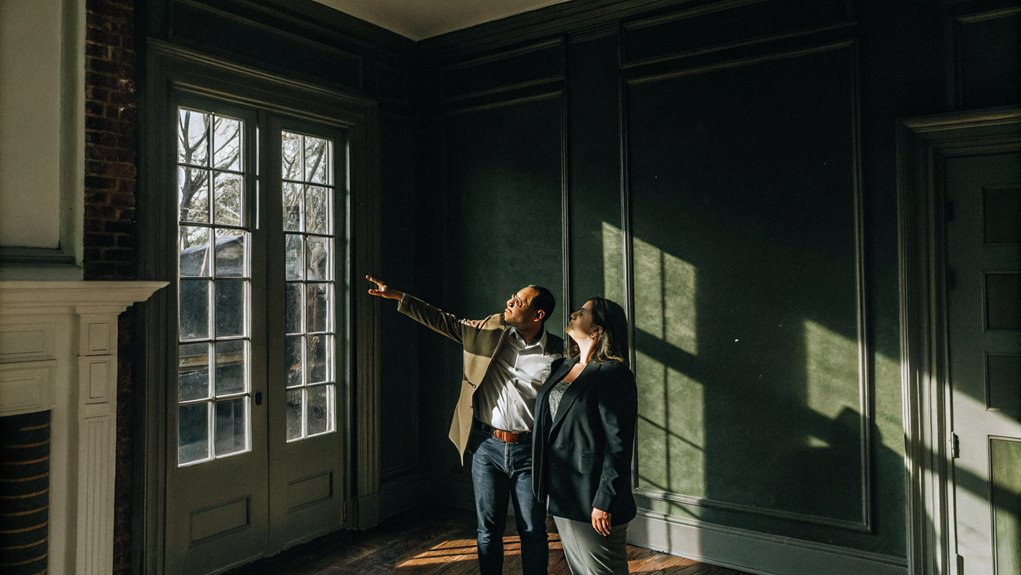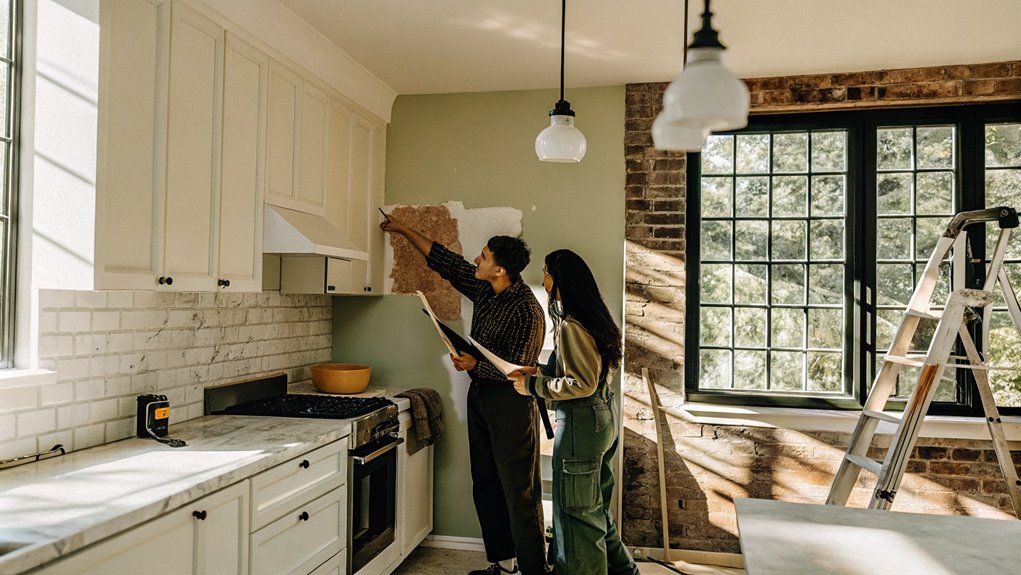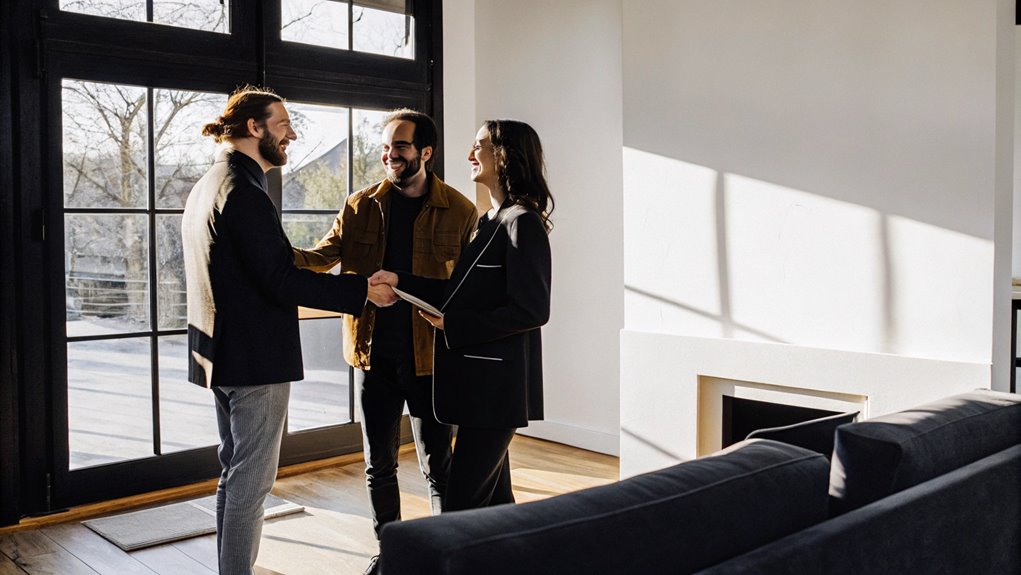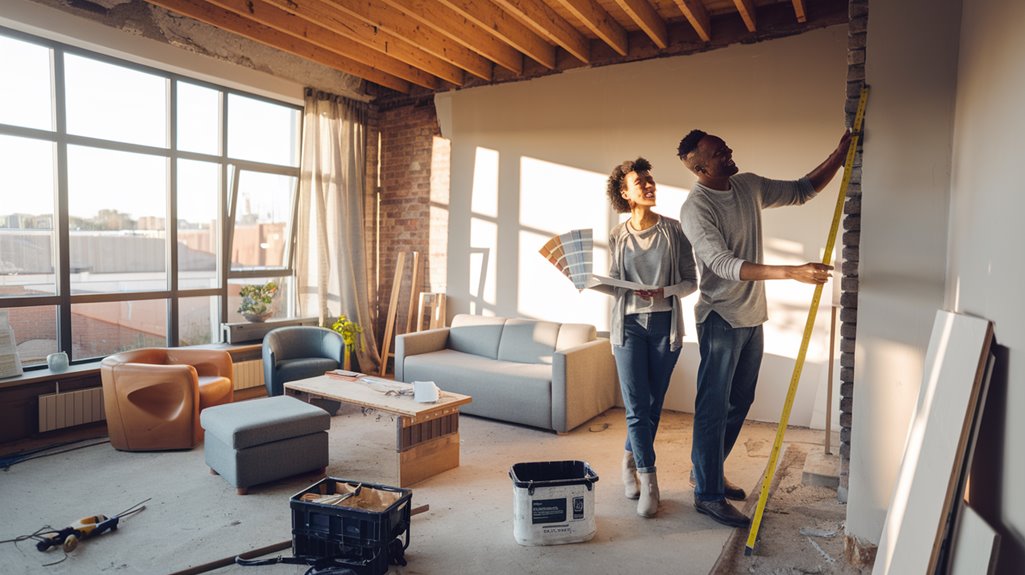When you want to make money fixing up an old house, you need to be smart about it. First, look at good spots where people want to live. Get someone who knows houses to check if the house is strong and safe. Keep track of how much homes cost in the area.
Make a list of what needs to be fixed and how much it will cost. Save extra money just in case – about 20% more than you think you'll need. When you fix things up, don't spend more than $20 for every $100 the house might be worth later.
Fix the big problems first, like leaky roofs or broken pipes. Then make the house look nice on the outside. Find good workers who know how to fix houses, and work with people who sell homes. Get help from folks who know how to make houses look great.
If you do these things, you can turn an old house into one that makes you money when you sell it.
Ready to start building equity in your own Michigan home? Get your personalized home loan quote today.
Evaluating Potential Properties

Finding a home to fix up takes careful planning. Let's look at homes step by step.
First, check out the area. Look at shops, parks, and schools nearby. See what other homes sold for. This helps you know how much your fixed-up home could sell for later.
Next, look at the home's basic parts. Check the:
- Bottom of the house
- Roof
- Wiring
- Pipes
- Heating and cooling
These parts cost a lot to fix. Try to find homes that are strong but just look old. These homes can make you the most money.
Don't forget the costs while you fix the home:
- House payments
- Power and water bills
- Taxes
Ask a home inspector to help. They can find problems you might miss. This helps you avoid big surprises that cost extra money.
Michigan residents, unlock the door to your new home. Request your home loan quote from Treeside Financial today.
Budget Planning and Cost Analysis
When you buy a fixer-upper home, you need to plan your money well.
First, make a list of what needs to be fixed. Then ask builders how much each fix will cost.
Think about how much money you can make later. Look at what similar fixed-up homes sell for in your area.
Keep your fix-up costs low – spend no more than $15-20 for every $100 the house might be worth when it's done.
This helps make sure you can sell it for more than you spent.
Assess Repairs and Costs
You need to know what repairs your house needs and how much they'll cost before you start fixing it up.
Get help from home inspectors and builders who can check the house carefully. They'll look at important things like:
- If the house is strong and safe
- If the lights and power work well
- If the water pipes are good
- If there are any hidden problems
Common House Repairs and Costs:
- House frame and base: Very important – $5,000-$40,000
- Power and water pipes: Important – $3,000-$15,000
- Making things look nice: Less important – $2,000-$20,000
Make a list of every repair you need. Write down what things cost, like wood and paint.
Also write down what workers will charge you. Add 20% more money to your budget just in case you find more problems later.
Make sure the fixed-up house will be worth more than what you spend on repairs.
Calculate Return on Investment
When you fix up a house, you need to know if you'll make money. Look at other fixed-up homes that sold near you. This helps you know how much your house could sell for when it's done.
Here's a simple way to find out if the price is right: Take the fixed-up value and multiply it by 0.7. Then take away how much the repairs will cost. This tells you the most you should pay for the house.
Remember to count all the extra costs too. This means things like:
- Fees to own the house while you fix it
- Papers you need to do the work
- Money you pay people who help sell the house
Think about what could go right and what could go wrong. This keeps you safe if things cost more than you thought or if house prices change.
Set Renovation Cost Limits
When you fix up houses, you need to know how much money you can spend. Smart house flippers look at what homes sell for in their area. Then they make rules about spending.
Here are the main costs when fixing a house:
Kitchen work: $15,000 to $35,000
Bathroom work: $8,000 to $20,000
Big repairs: $10,000 to $40,000
Paint and small fixes: $5,000 to $15,000
To make a good budget:
- Pick your sale price
- Take out what you paid for the house
- Take out the money you want to make
- Set aside extra money for surprises
The best way to make money is to use good, basic materials that most buyers like. This helps you sell the house faster.
Prioritizing Repairs and Renovations

Your home needs fixing? Start with what keeps you safe. Check if the walls and floors are strong. Make sure the wires and lights work well. Fix any wet spots or leaks first. These big fixes matter more than making things look nice.
Think about what'll help your home's value grow. Look at other homes in your area to see what makes them worth more money.
It's fun to pick new paint colors or pretty floors, but the basic fixes must come first. Once you fix the big stuff, your home will be ready for the fun changes that make it look better.
Start With Safety First
Safety First – Protect Your Home
Old pipes and cracked walls can tell you what needs fixing first. Fix the big problems before making things look nice. This keeps everyone safe and helps your home stay strong.
Get help from an expert to:
- Look for unsafe materials like old paint
- Check if the electricity is working right
- Make sure the house is strong
Fix these things right away:
- The base of the house
- The roof
- All water pipes
Put in good fire safety tools:
- New smoke alarms
- Ways to get out if there's a fire
- Safe electrical wiring
When you fix safety problems first, you make your home better for everyone.
Good tenants will want to live there. Your house will pass safety checks. This is how you make a smart investment.
Calculate Cost Versus Value
Money-smart home owners think carefully about fixing up their homes. They want to know which fixes will give them the most money back when they sell. It's like saving money while making the house better.
Look at what things cost to fix:
| What to Fix | Money Back |
|---|---|
| Kitchen | 70-80% |
| Bathroom | 60-80% |
| Outside Look | 75-85% |
To make the best choices:
- Ask many workers how much things cost
- See what other homes in your area sell for
- Fix what's broken first
Some fixes you must do, like a new roof. But buyers get more excited about a pretty kitchen. Pick the fixes that make your house safe and look good too. This helps you spend your money wisely.
Think about who might buy your house. Fix things they would want. This way, you don't waste money on things that won't help sell the house.
Building Your Renovation Team
When you fix up an old house, you need good people to help you. Think of them as your home fix-up team. The main person you need is a builder who knows how to fix old houses. They make sure all the work is done right.
You also need:
- A home agent who knows about old houses
- Someone who can check the house for big problems
- A money person who can help you get loans for fixing houses
Your team should have people who know how to:
- Fix wires
- Fix pipes
- Fix heating and cooling
If you want to make the house look really nice inside, you might want someone who knows about making rooms look pretty.
Each person on your team will help make your old house new again. They work together to fix things the right way and follow all the rules. This helps you stay on time and not spend too much money.
Marketing Your Finished Property

Selling your fixed-up home is like telling a good story. Show people how you made it better with pictures of how it looked before and after. This helps them see all your hard work.
Get a good photographer to take bright, clear photos. Make sure they show off the new parts of your home. Take pictures of new appliances and any cool tech you added.
Put your home listing in many places. Use real estate websites and social media to reach more buyers.
Have a party at your house! Let people walk through and see all the nice changes up close. Give them papers that list every new thing you fixed or added. Show them how the home saves money on power bills.
Look at what other homes in your area sold for recently. This will help you pick the right price for your home.
Financing Options and Exit Strategies
When you fix up houses, you need good ways to pay for it and plans to make money. Think about bank loans, private loans, or working with friends who can help pay. Make sure your plans match what buyers want right now.
Your money plans should change as the market changes. You might want to:
- Sell the house fast
- Keep it until it's worth more
- Rent it out to others
You can:
- Use your home's value to get cash for new projects
- Team up with others to buy bigger houses
- Rent the house with an option to buy if home sales are slow
Keep an eye on what houses sell for in your area. This helps you make smart choices about when to sell or rent.







